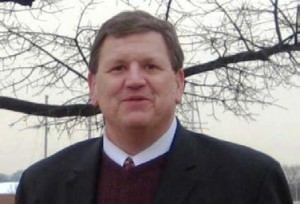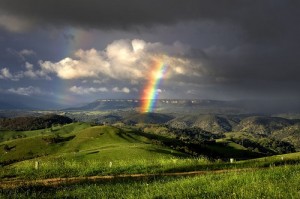by Eugene Peterson
Trembling is not, as outsiders so often think, being scared in the presence of God. It is something more like a holy playfulness, like faith frolicking. “Nature” is commonly viewed as a vast mathematical structure of cause and effect, the skies and oceans governed by rod-of-iron rules. Anyone who dares defy them is broken in pieces like a potter’s vessel. According to the iron rod of gravity, for instance, my leg shatters when I fall out of a tree. According to the iron rule of thermodynamics, my finger burns as I retrieve my fork from the fire.
Prayer is not defiant or dismissive of these necessities but instead knows that there is more than necessity in the creation; there is also freedom. Prayer understands that we do not live an ironclad universe of cause and effect. In the presence of the God of Jacob, there is life that is beyond prediction. There is freedom to change, to become more than we were in the presence of the God who “turns the rock into a pool of water, the flint into a spring of water.”
Miracles are not interruptions of laws that must then either be denied by worried intellectuals or defended by anxious apologists. They are expressions of freedom enjoyed by the children of a wise and exuberant Father. We do not solve these things with rigorous exegesis of the biblical text or with controlled experiments in a laboratory; we pray them, and in praying enter into dimensions of personal freedom in the universe. At some level (probably beyond the level of academic comprehension, although not necessarily– the writings of the ‘new physics’ are unexpectedly illuminative of these truths), we are in a dance. In it, necessity and freedom are synchronized and responsive to each other, each dependent on the other, alive, and personal.
Our True Home
We do not begin life on our own. We do not finish it on our own. Life, especially when we experience by faith the complex interplay of creation and salvation, is not fashioned out of our own generic lumber and cultural warehouses. It is not hammered together with the planks and nails of our thoughts and dreams, our feelings and fancies. We are not self-sufficient. We enter a world that is created by God, that already has a rich history and is crowded with committed participants— a world of animals and mountains, of politics and religion; a world where people build houses and raise children, where volcanoes erupt lava, and rivers flow to the sea; a world in which, no matter how carefully we observe and study it, surprising things keep on taking place (like rocks turning into pools of water). We keep on being surprised because we are in on something beyond our management, something over our heads.
In prayer we realize and practice our part in this intricate involvement with absolutely everything that is, no matter how remote it seems to us or how indifferent we are to it. This prayer is not an emotional or aesthetic sideline that we indulge in after our real work is done; it is the connective tissue of our far-flung existence. The world of creation interpenetrates the world of redemption. The world of redemption interpenetrates the world of creation. The extravagantly orchestrated skies and the exuberantly fashioned earth are not background to provide a little beauty on the periphery on the godlike ego. They are the large beauty in which we find our true home, room in which to live the cross and Christ expansively, openhearted in praise.
Eugene H. Peterson is a pastor, scholar, author, and poet. He has written over thirty books, including Gold Medallion Book Award winner The Message: The Bible in Contemporary Language(Navpress Publishing Group, 2002), a contemporary paraphrase of the Bible. This excerpt appeared in The Best Preaching on Earth edited by Stan L. LeQuire and published by Judson Press in collaboration with the Evangelical Environmental Network in 1996. This is the fourth of a four part series on the theme of Creation in the Psalms.















